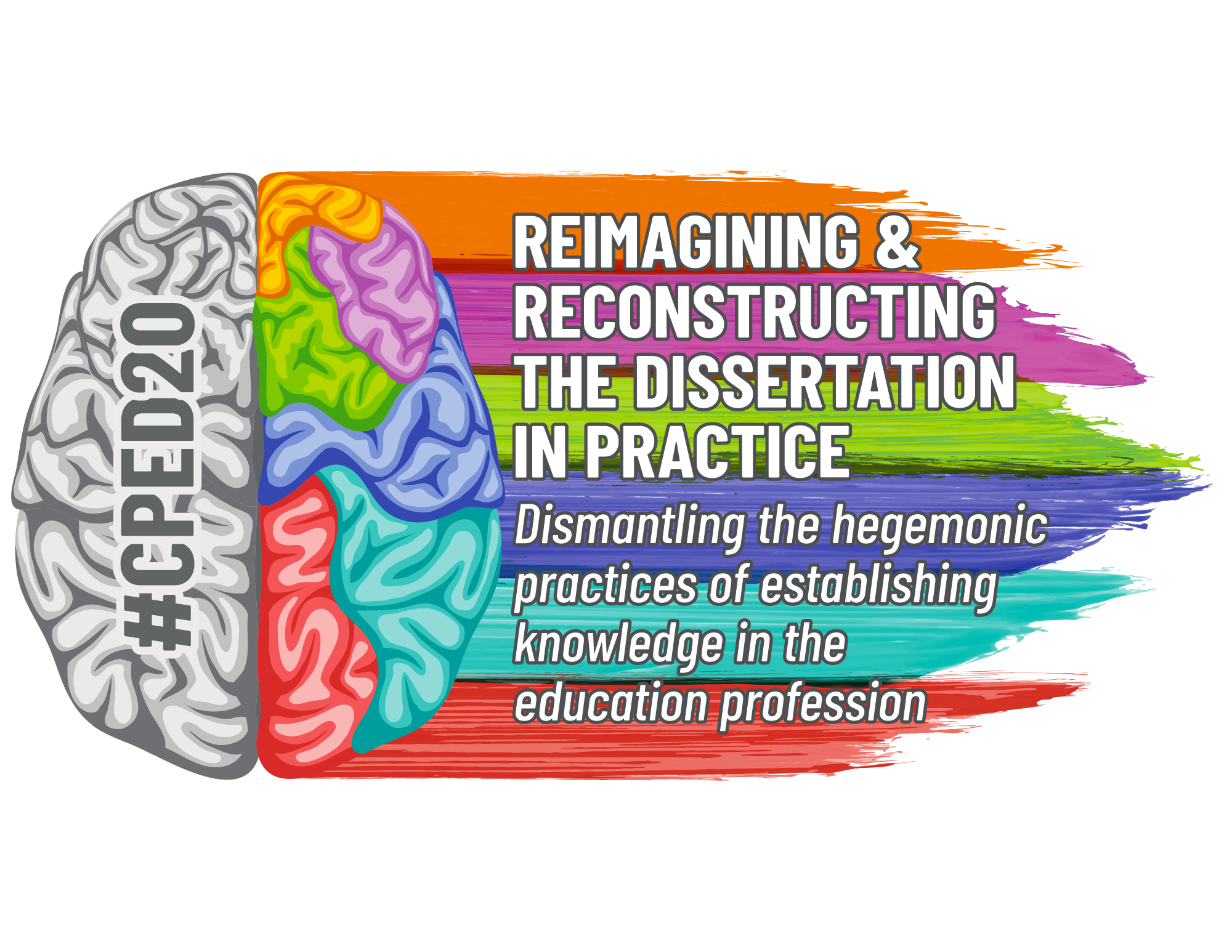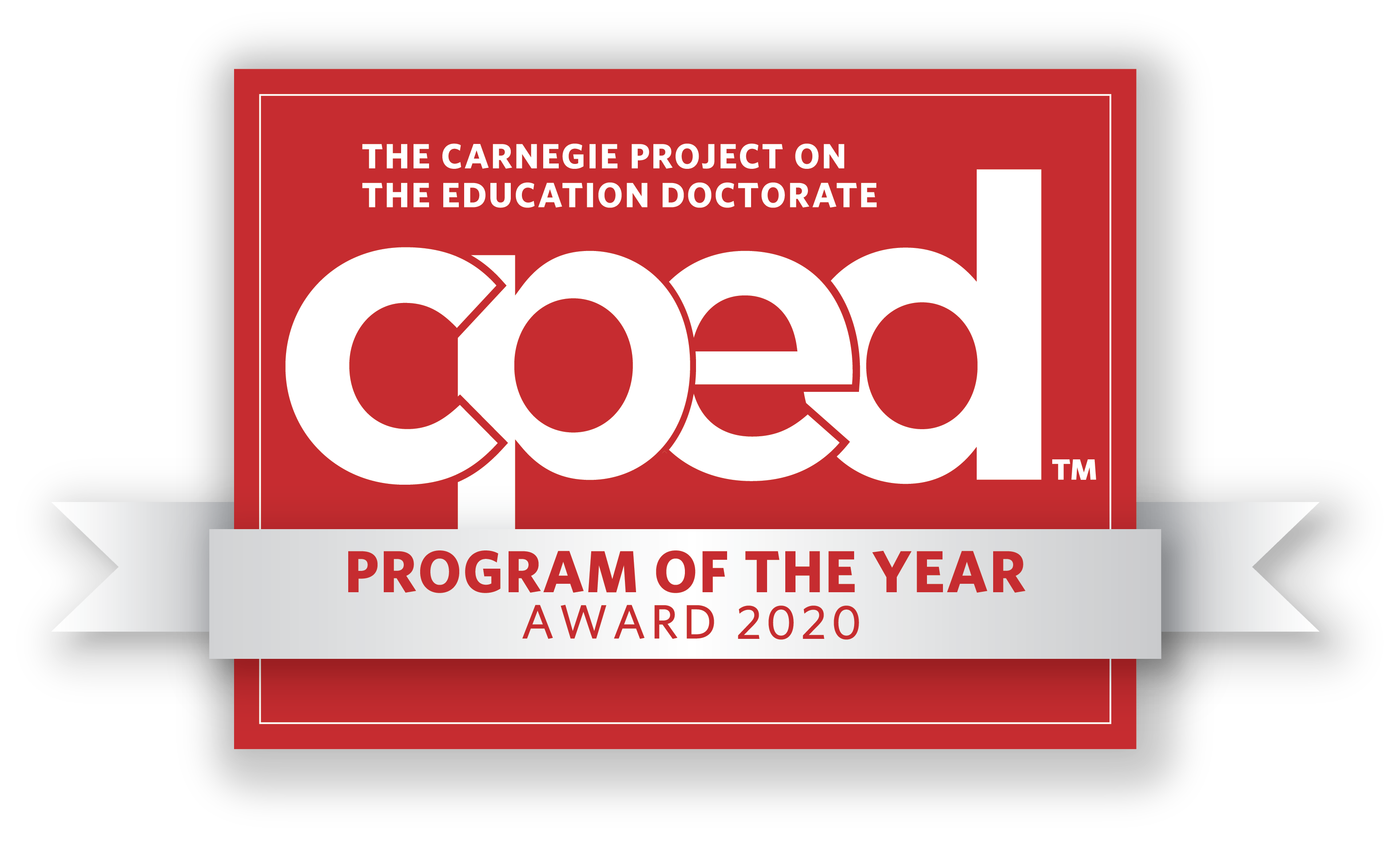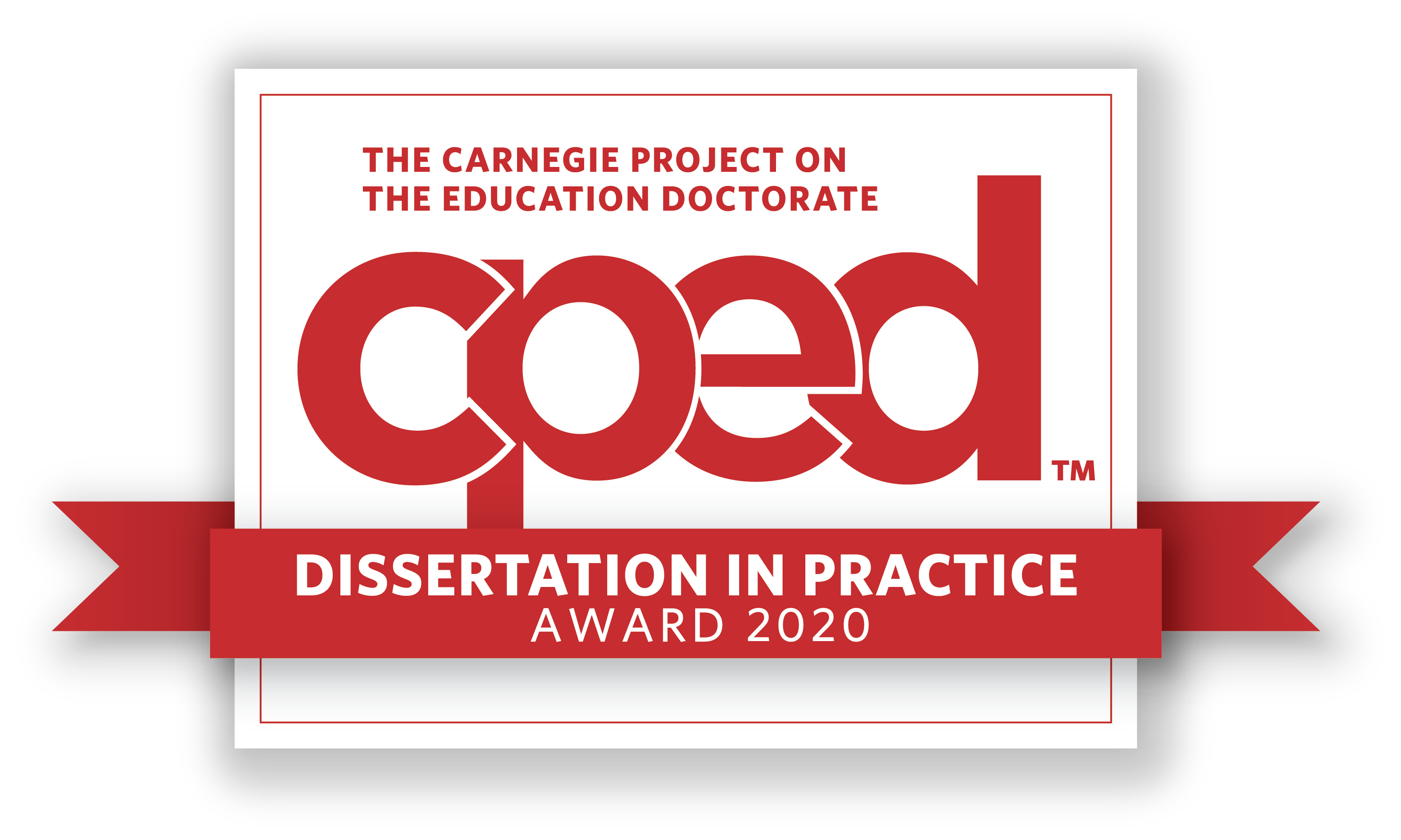#CPED20 ANNUAL & VIRTUAL CONVENING
FREE for CPED Members
October 14 - 16, 2020

REIMAGINING & RECONSTRUCTING THE DISSERTATION IN PRACTICE:
Dismantling the hegemonic practices of establishing knowledge in the education profession
View Agenda
Session Zoom Links
Exciting plans are underway for the #CPED20 October Virtual Convening!
In light of the COVID-19 pandemic, CPED is going completely virtual for this year’s Convening from October 14 - 16, 2020. We are taking advantage of this opportunity to offer the virtual convening for FREE for EdD faculty and administrators at CPED-member institutions.
We invite you and your colleagues to attend the convening for free as a professional development opportunity. We hope you will join us for this unique and collaborative experience with fellow EdD colleagues.
Congratulations to our 2020 CPED Award Winners!
Program of the Year Award:

University of Florida - Education Doctorate in Teachers, Schools, and Society
Dissertation in Practice of the Year Award:

Sherisse Jackson, EdD. University of South Carolina
Leslie Richard, EdD. University of South Carolina
David G. Imig Distinguished Service Award:
Ray Buss, PhD. Arizona State University
Lauri Johnson, PhD. Boston College
Table of Contents:
- Theme Overview
- Convening Highlights
- What is a Learning Exchange?
- Formats for Exchanges & Workshops
- What Does It Mean To Go Virtual?
- Contact Us
Theme Overview
According to the Council of Graduate Schools Taskforce on the Professional Doctorate (2006), professional doctorates fall into two categories: those with a dissertation and those without. The degrees that have a dissertation have “no direct relationship to licensure and have a significant relationship to clinical, translational, or engaged research” (p. 12).
Because the field of education does not have a licensure body, some product or experience is needed to demonstrate to the faculty that the student is qualified and has done the work worthy of earning the education doctorate degree. Colwill (2012) has further described professional degrees that require a dissertation as a Professional Research Doctorate, one that focuses on both research and practice, and that requires a dissertation to “investigate a particular professional topic or existing problem” (p. 13).
CPED members have strived to reframe the dissertation in their EdD programs to make it align with Colwill’s definition. As a result, CPED members have renamed the dissertation for the EdD to the Dissertation in Practice (DiP), which is a scholarly endeavor that impacts a complex problem of practice.
Despite this clear definition, the task of changing the format and expectations of the final product presents various challenges. Historically, the dissertation is synonymous with doctoral education. The academy has utilized this exercise “to confer expertise by winnowing out the amateurs from the experts” (Loss, 2015, p.3).
To many faculty members who completed their own traditional dissertation or for practitioners who know colleagues who spent years working alone on a lengthy research project, the traditional dissertation is the gold standard. Further, most education faculty are not trained in program design and tend to follow what they know by designing programs around theory and research.
Finally, practitioner needs are not front and center in the purpose of the dissertation. Rather than provide practical, applicable skills, the traditional dissertation is an extensive experience that may be informative but may not help the practitioner apply theory to practice. Hegemonic practices of book-length monographs don't reflect the career goals of EdD students or let them demonstrate what they know beyond the narrow borders of academe (Patton, 2013). It’s time to dismantle our thinking about knowledge production in the practice of education.
In spite of these challenges, CPED member institutions have changed the dissertation to some degree. We have seen various forms of group dissertations, format changes such as modified manuscripts and portfolio models, purpose changes such as client evaluation models, and methodology changes such as action research and improvement science. Though some members have created new frameworks, requirements, and rubrics we must still ask ourselves - are these enough to support practitioners learning to transform their practice? Are we addressing needs of practitioners or remaining tied to traditional academic thinking preferencing the academy over the field?
As it stands, the majority of current Dissertations in Practice still look and feel like five-chapter dissertations. We have yet to demonstrate how this exercise demonstrates the ways in which practitioners are better prepared to “apply appropriate and specific practices, generate new knowledge, and steward the profession” (CPED definition of the EdD).
The challenge of the traditional dissertation has also been troublesome in the humanities. Since the mid-2000s, fields such as history, English, and communications have been debating and rethinking the role and purpose of the traditional dissertation in their PhD programs. In many cases, students in these fields can take 7-10 years to complete their dissertations and spend the majority of their time writing versus researching.
Further, with the need for knowledge mobilization and digital forms of expression, the end products are increasingly becoming less useful for their students who are more and more entering practice positions and not the academy. In 2013, Stacy Patton wrote in the Chronicle of Higher Education that the traditional dissertation can no longer be defended. She noted that many fields were moving to digital and more interactive dissertation models. For instance, history students might develop products that are useful to museums, or digital interactive historical maps. Other fields allow for interactive websites that let students document their research experience, or e-books that share additional information to guide readers of the student’s work. These ideas are applied and useful to the student and to their practice and field.
While few, there have been innovative EdD dissertations. For example, in 2014 Nick Sousanis, an EdD graduate from Columbia University's Teachers College, wrote and drew his dissertation in comic-book form. Sousanis’ dissertation, Unflattening: A Visual-Verbal Inquiry into Learning in Many Dimensions, broke traditional norms by weaving together philosophical essays and theory with graphic images. His work made a profound contribution to the study of comics, semiotics, epistemology, and visual thinking as they apply to teaching. His work has also become recommended reading for students wanting to utilize visual narrative form (Dunn, 2014).
It is time for CPED members to recognize that the format of a bound volume mimicking a scholarly book needs to be deconstructed. We must value the needs of practitioners and utilize the DiP exercise as a means to demonstrate preparation for becoming a Scholarly Practitioner. The goal of the convening is to collaboratively reimagine and reconstruct the Dissertation in Practice (DiP).
Convening Highlights
Our goal is to stay true to the CPED vision of a convening; with lots of interaction, sharing, and learning across our membership. Because we are going virtual, we anticipate record numbers of members and non-members participating. Therefore, we invite all EdD faculty and administrators to consider this opportunity to participate in CPED!
Over 30 Learning Exchanges - Faculty from CPED member EdD programs will present interactive Learning Exchanges in a variety of digital formats to engage participants in collaborative learning and discussion. While most Learning Exchanges will be in breakout sessions, we will also host a keynote Large Group Exchange session. Learn more about CPED Learning Exchanges below. The full agenda will be announced soon.
Three Pre-Convening Workshops - We are excited to announce three pre-convening workshops on Tuesday, October 13th from 2:00 - 4:00 PM EST to kick-off the Convening! Workshops will offer participants more time to learn and collaborate around ideas than learning exchange sessions. This year's pre-convening workshops are free, but limited to 50 participants. Registration is required, so sign-up for a workshop today!
Speaker Nick Sousanis, EdD - Dr. Sousanis, Eisner-winning comics author and an assistant professor of Humanities & Liberal Studies at San Francisco State University, where he is starting a Comics Studies program - will share his experience and process of developing an alternative format EdD dissertation at Teachers College, Columbia University. Sousanis’ dissertation, Unflattening: A Visual-Verbal Inquiry into Learning in Many Dimensions, broke traditional norms by weaving together philosophical essays and theory with graphic images. Nick will engage members in activities to help think beyond a five chapter dissertation.
The US Council of Graduate Schools will join CPED to discuss its recent work that investigates the future of the dissertation and doctoral education. Discussions will include how the humanities and other fields have framed the dissertation to make it more usable in professional and practice settings.
CPED Student Research Forum: Building Community for Emerging Scholarly Practitioners - We are dedicating a day - Tuesday, October 13th - to EdD students which includes a series of presentations and workshops intended to build a supportive student community within the CPED network. This is a free opportunity for students enrolled in CPED-member EdD programs to present and share work in practice, along with networking with fellow scholarly practitioners.
Networking & Reception - We will host virtual networking opportunities including Coffee & Challenge discussions and an end-of-day reception to meet fellow colleagues and toast to the 100th anniversary of the EdD.
What is a Learning Exchange?
Despite moving to a virtual convening, CPED is committed to providing interactive ways for its members to engage with, and learn from, each other in concurrent breakout learning exchange sessions. Convening evaluations have told us members want to avoid sit-and-get sessions and instead to engage in active professional development that enables them to take away materials and/or ideas that they can use. To accomplish this, we are committing to an interactive online experience that will develop highly engaging exchange sessions.
Small Group Exchanges
Small Group Exchanges are presented concurrently in Zoom rooms. Exchanges can be facilitated by an individual or done collaboratively across departments or institutions. To promote the interactivity and engagement in a virtual setting, CPED will provide online supports for presenters. See below for more information about going virtual.
CIG Sponsored Small Group Exchanges open to CIG members:
CIG Sponsored Exchanges will capture the spirit and focus of the CIG’s work and/or the convening’s theme as they relate to the CPED Improvement Group (CIG). CIG leaders develop the call for these exchanges and will be involved in reviewing proposals. New convening attenders are welcome to join CIG exchanges as part of their more general welcome to CPED. CIGS are: Social Justice and the EdD, On-Line and Hybrid programs, Improvement Science, and Group Dissertations.
Formats for Small Group Exchanges:
- Panel presentation with interactive discussion: This type of session might have a group of faculty or students (or a mix) presenting about a program/DiP design but will offer learning steps for participants and time for interactive discussion or activity.
- Fishbowl: This type of session will offer participants a look into a process by watching a group of presenters “play out” or “try out” and activity such as a design meeting, a dissertation presentation, etc. Participants will learn from watching the process and have time to ask questions/interact with presenters.
- Challenge Room: This type of session presents a short bit of information about a topic or idea and engages the participants in a broader discussion. Ideas are generated, documented, and then shared with the participants.
- Book/Article Discussion: This type of session will ask participants to consider a book or article relevant to EdD programs –design or content—and engage them in discussion about the value, relevance, etc of the materials. Book or articles can be distributed before the convening.
- Collaborative Development (syllabi, protocols, etc.): This type of session is a kind of brainstorming that will bring participants together to collaboratively develop products or tools for EdD program. For example, participants might generate a syllabus on teaching equitable and just leadership. Participants get to take ideas/products with them.
What Does It Mean To Go Virtual?
CPED is designing our Virtual Convening to optimize interactive and engaging learning exchanges.
To support our presenters:
- A CPED chair will be present in each learning exchange to support technical logistics so presenters can focus on facilitating an engaging session
- Pre-session training and resources for presenters
- Tutorials on how to login and access virtual sessions
- Learning Exchanges will be live-streamed and the presentation portion of each exchange will be recorded and shared with all convening participants
- We have no specific requirements for learning exchange formats to give presenters the flexibility to be creative.
Each learning exchange will have the following features available for presentations:
- File Transfer – hosts and participants can send files through the in-meeting chat
- Polling – live polling of attendees
- Screen Sharing – both hosts and participants can share screens
- Breakout Rooms – sessions can be split into small groups
- Whiteboards for interactive small group work
Questions?
Contact Carolyn Carlins, Operations Manager, [email protected]
Bibliography
Loss, C. (2016). Future of the dissertation: A brief history of doctoral discourse. proceedings from the Council of Graduate Schools’ what is a doctorate? Online Proceedings of the 2016 Global Summit.
Colwill, D. A. (2012). Educating the scholar practitioner in organization development (Contemporary Trends in Organization Development and Change). Charlotte, NC: Information Age.
Council of Graduate Schools (2007). Task force report on the professional doctorate. Washington, DC.
Dunn, S, (2014). The amazing adventures of the comic book dissertator. Retrieved 29 December 2019 from, The Chronicle of Higher Education.
Patton, S. (2013). The dissertation can no longer be defended. Chronicle of Higher Education, available at http://chronicle.com/article/The-Dissertation-Can-No-Longer/137215